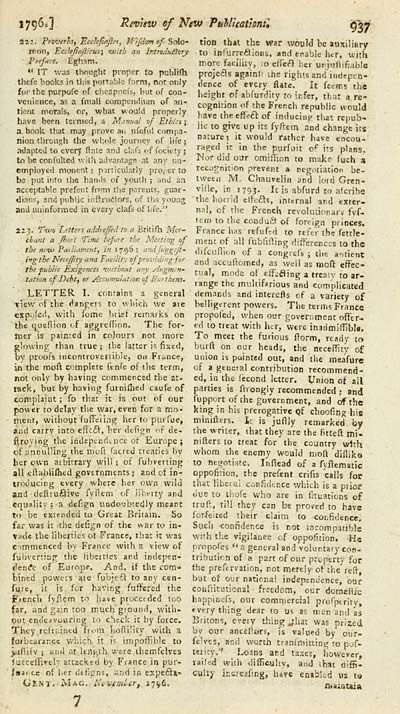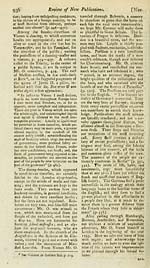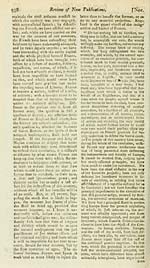Download files
Complete book:
Individual page:
Thumbnail gallery: Grid view | List view

17960
Review of NfW PuhlUatiom,
22 2. Traverh^'EcchftaJlny J'FifdomofSo\o-
mon, Ecc}ejinj}:cui\ iu:th an Irtrodueiory
Prffrice. Egham.
*' IT was thought proper to publiflx
tliefe books in this poitrible form, not only
for the purpofe of chcapncls, hut of con-
venience, as a fmall compendium of an-
tieiit morals, or, what would properly
have been termed, a M.imial tjj Eihia •
a book that may prove an ufoful compa-
nion through the vvi^.ole journey of life ;
adapted to every flate and clrifs of locitty;
to be confuUed uitli advantage at any un-
employed monent ; particularly proj er to
be put into the hands of youth ; and aa
acceptable prefent from the pnrents, guar-
dian?, and public inftruttors, of ths young
and uuinforaied in every clafs of life."
Two Letters addrejfed to a Britifh Mer-
^37
tion that the war would be auxiliary
to in'urreaions, and enable her, with
more facility, .o etfefl her urinflifinble
projeas again! ihe rights anri'iudepen-
dence of every flate. It feems the
height of abfurdity to irfer, that a re-
cognition of the French republic would
have theeftVft of inducing that repub-
lic to give up its fyftem and change its
nature; it would rather have encou-
raged it in the purfuit o^ its plans.
Nor did our omifiion to make fuch a
recognition prevent a negotiation be-
tvveen M. Chauvelin and lord Gren-
ville, in 1793. Ic is abfurd to afcrihe
the hotiid ettc£ls, internal ard exter-
na], cf the French revolutionary fvf-
tem to the conduct of fonign princes.
France has refuftd to refer the fettle-
cl.wt a Jhort rime UJure the Mcetmg of ment of all fubliaing differences to the
''■''' ' ... .--<i .?r..__.,j difcviflion of a congrefs ; th-
the yww Pailuimcnt, in 1796 ; andjuggcji'
irg the Neccffity ana Facility of providing for
the public Exigences ivithout any Augmen-
tation of Debt, or Accumulation of Bui them.
LETTER I. contains a general
view of the dangers to which we are
expiMC.l, with feme brief remarks on
the cjucfiion tf aggrefTion. The for-
iner is painred in colours not more
glowing than true ; the latter is fixed,
bv proofs incontrovertible, on France,
in the mod complete i'cnfe of the term,
not only by having commenced the at-
tack, but by having furnifhed caufe of
complaint ; fo that ic is out of our
power to delay the war, even for a mo-
ment, without (uffeiing her to purfue,
and carry into efF:6V, her defign <if de-
l^roying the independence of Europe;
of c'.nnuUing the meft facrtd treaties by
her own arbitrary will ; of fubverting
all eftablilhed govtrnments ; and of in-
troducing every where her own wild
and deflruftive fviiem of libnty and
equality ; a defign undoubtedly meant
to be extended to Great Britain. So
far was it the dt%n of the v>.ar to in-
vade the liberties of France, that it was
commenced by France with a view of
fubverting the lil)erties ard indepen-
dence of Europe. And, if the com>*
bined powers aie fubjeft to any csn-
fure, it is for having fufiFered the
f lendi fyftem to have proceeded too
far, and gain too much ground, with-
out endciivouring to cScck ic by force.
They refrained from hoflility with a
forbearance which, it is impof)il)le to
yafiifv ; and at Itngth were therofelves
fucceflively attacked by France in pur-
'»ai ce of her dtfigns, and in cspefta-
G1.NT. 2*1ag. Ncv£mUr,, 1796.
ticnt
and accufiomed, as well as moft effec-
tual, mode of efF.'fling a trea:v to ar-
range the multifarious and complicated
dem.inds and interef^s of a variety of
belligerent powers. The terms France
propoled, when our goven.menc offer-
ed to treat with her, were inadmilTibla,
To meet the furious florm, ready to
burft on cur heads, the necefhtv of
union is pointed out, and the meafure
of a general contribution recommend-
ed, in the f'econd letter. Union of all
parties is ftrongly recommended ; and
fupport of the government, and of the
king in his prerogative qf choofing hie
mmiiters. It is juflly remarked by
the writer, that they are the fitted mi-
nifters to treat for the country with
whom the enemy would moft dillika
to negotiate. Inflead of a fyflematic
oppofition, the prefent crifis calls for
that hber^.i confidtnce which is a prior
due to tiiofe who are in fituations of
truft, till they can be proved to have
forfeited their claim to confidence.
Such confidence is not incompatible
wirh the vigilance cf oppofuion. He
propojes " a general and voluntary con-
tribution of a part of our property for
fhe prefcrvalion, rot merely of the reft,
but of our national independence, our
confiitutional freedom, our dcmelijc
happincTs, oar comuiercial proCptrity,
everything dear to us as men and as
Britons, erety thing jhat was prized
by our ancef^ars, i's valued by our-
felves, a.id worth trani'mitting to pof-
terity.'' Loans ard taxes, however,
raifsd with diflicultv, and that difS-
culty incrcifing, liave enabkd us to
niaiotaia
Review of NfW PuhlUatiom,
22 2. Traverh^'EcchftaJlny J'FifdomofSo\o-
mon, Ecc}ejinj}:cui\ iu:th an Irtrodueiory
Prffrice. Egham.
*' IT was thought proper to publiflx
tliefe books in this poitrible form, not only
for the purpofe of chcapncls, hut of con-
venience, as a fmall compendium of an-
tieiit morals, or, what would properly
have been termed, a M.imial tjj Eihia •
a book that may prove an ufoful compa-
nion through the vvi^.ole journey of life ;
adapted to every flate and clrifs of locitty;
to be confuUed uitli advantage at any un-
employed monent ; particularly proj er to
be put into the hands of youth ; and aa
acceptable prefent from the pnrents, guar-
dian?, and public inftruttors, of ths young
and uuinforaied in every clafs of life."
Two Letters addrejfed to a Britifh Mer-
^37
tion that the war would be auxiliary
to in'urreaions, and enable her, with
more facility, .o etfefl her urinflifinble
projeas again! ihe rights anri'iudepen-
dence of every flate. It feems the
height of abfurdity to irfer, that a re-
cognition of the French republic would
have theeftVft of inducing that repub-
lic to give up its fyftem and change its
nature; it would rather have encou-
raged it in the purfuit o^ its plans.
Nor did our omifiion to make fuch a
recognition prevent a negotiation be-
tvveen M. Chauvelin and lord Gren-
ville, in 1793. Ic is abfurd to afcrihe
the hotiid ettc£ls, internal ard exter-
na], cf the French revolutionary fvf-
tem to the conduct of fonign princes.
France has refuftd to refer the fettle-
cl.wt a Jhort rime UJure the Mcetmg of ment of all fubliaing differences to the
''■''' ' ... .--<i .?r..__.,j difcviflion of a congrefs ; th-
the yww Pailuimcnt, in 1796 ; andjuggcji'
irg the Neccffity ana Facility of providing for
the public Exigences ivithout any Augmen-
tation of Debt, or Accumulation of Bui them.
LETTER I. contains a general
view of the dangers to which we are
expiMC.l, with feme brief remarks on
the cjucfiion tf aggrefTion. The for-
iner is painred in colours not more
glowing than true ; the latter is fixed,
bv proofs incontrovertible, on France,
in the mod complete i'cnfe of the term,
not only by having commenced the at-
tack, but by having furnifhed caufe of
complaint ; fo that ic is out of our
power to delay the war, even for a mo-
ment, without (uffeiing her to purfue,
and carry into efF:6V, her defign <if de-
l^roying the independence of Europe;
of c'.nnuUing the meft facrtd treaties by
her own arbitrary will ; of fubverting
all eftablilhed govtrnments ; and of in-
troducing every where her own wild
and deflruftive fviiem of libnty and
equality ; a defign undoubtedly meant
to be extended to Great Britain. So
far was it the dt%n of the v>.ar to in-
vade the liberties of France, that it was
commenced by France with a view of
fubverting the lil)erties ard indepen-
dence of Europe. And, if the com>*
bined powers aie fubjeft to any csn-
fure, it is for having fufiFered the
f lendi fyftem to have proceeded too
far, and gain too much ground, with-
out endciivouring to cScck ic by force.
They refrained from hoflility with a
forbearance which, it is impof)il)le to
yafiifv ; and at Itngth were therofelves
fucceflively attacked by France in pur-
'»ai ce of her dtfigns, and in cspefta-
G1.NT. 2*1ag. Ncv£mUr,, 1796.
ticnt
and accufiomed, as well as moft effec-
tual, mode of efF.'fling a trea:v to ar-
range the multifarious and complicated
dem.inds and interef^s of a variety of
belligerent powers. The terms France
propoled, when our goven.menc offer-
ed to treat with her, were inadmilTibla,
To meet the furious florm, ready to
burft on cur heads, the necefhtv of
union is pointed out, and the meafure
of a general contribution recommend-
ed, in the f'econd letter. Union of all
parties is ftrongly recommended ; and
fupport of the government, and of the
king in his prerogative qf choofing hie
mmiiters. It is juflly remarked by
the writer, that they are the fitted mi-
nifters to treat for the country with
whom the enemy would moft dillika
to negotiate. Inflead of a fyflematic
oppofition, the prefent crifis calls for
that hber^.i confidtnce which is a prior
due to tiiofe who are in fituations of
truft, till they can be proved to have
forfeited their claim to confidence.
Such confidence is not incompatible
wirh the vigilance cf oppofuion. He
propojes " a general and voluntary con-
tribution of a part of our property for
fhe prefcrvalion, rot merely of the reft,
but of our national independence, our
confiitutional freedom, our dcmelijc
happincTs, oar comuiercial proCptrity,
everything dear to us as men and as
Britons, erety thing jhat was prized
by our ancef^ars, i's valued by our-
felves, a.id worth trani'mitting to pof-
terity.'' Loans ard taxes, however,
raifsd with diflicultv, and that difS-
culty incrcifing, liave enabkd us to
niaiotaia
Set display mode to: Large image | Transcription
Images and transcriptions on this page, including medium image downloads, may be used under the Creative Commons Attribution 4.0 International Licence unless otherwise stated. ![]()
| Early Gaelic Book Collections > Ossian Collection > Gentleman's magazine, and historical chronicle > Volume 66, Part 2 > (421) |
|---|
| Permanent URL | https://digital.nls.uk/79426823 |
|---|
| Description | Selected books from the Ossian Collection of 327 volumes, originally assembled by J. Norman Methven of Perth. Different editions and translations of James MacPherson's epic poem 'Ossian', some with a map of the 'Kingdom of Connor'. Also secondary material relating to Ossianic poetry and the Ossian controversy. |
|---|
| Description | Selected items from five 'Special and Named Printed Collections'. Includes books in Gaelic and other Celtic languages, works about the Gaels, their languages, literature, culture and history. |
|---|

